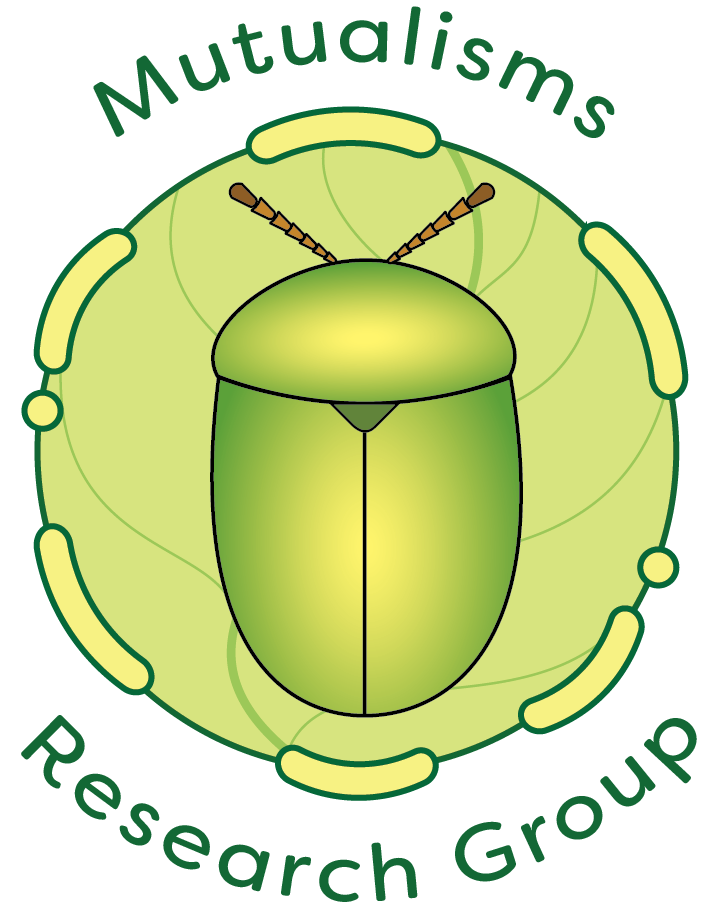Inès Pons, Ph.D.
Appointments
Humboldt Postdoctoral Fellow | 2020 - Present
Max Planck Institute for Biology
Tübingen, Germany
Postdoctoral Researcher | 2019 - 2020
Université catholique de Louvain
Louvain, Belgium
Education
Ph.D. Université catholique de Louvain | 2019
Louvain, Belgium
M.S. Université de Rennes | 2015
Rennes, France
B.S. Université de La Rochelle | 2013
La Rochelle , France
Fellowships & grants
Postdoctoral Research Fellowship | 2021
Alexander von Humboldt Foundation
Graduate Research Fellowship | 2016
National Fund for Scientific Research (F.N.R.S.)
Research interests
I am interested in the evolutionary ecology of bacterial mutualism in insects. My research focuses on how mutualistic associations evolve in nature, and more particularly on the mechanisms influencing their establishment and maintenance.
Publications
Pons I, García-Lozano M, Emmerich C, Ayas A, Henzler H, Enev H, Ley R, Salem H. (In press) Fidelity in co-diversified symbiosis.
Nature Communications
García-Lozano M, Henzler H, Porras M, Pons I, Berasategui A, Lanz C, Budde H, Oguchi K, Matsuura Y, Pauchet Y, Goffredi S, Fukatsu T, Windsor D, Salem H. (2024) Paleocene origin of a streamlined digestive symbiosis in leaf beetles. Current Biology, doi.org/10.1016/j.cub.2024.01.070
Porras M*, Pons I*, García-Lozano M, Jagdale S, Emmerich C, Weiss B, Salem H (2024). Extracellular symbiont colonises insect during embryo development. ISME Communications, doi.org/10.1093/ismeco/ycae005
Renoz F, Arai H, Pons I (2024). The genus Sodalis as a resource for understanding the multifaceted evolution of bacterial symbioses in insects. Symbiosis, https://doi.org/10.1007/s13199-023-00966
Berasategui A, Breitenbach N, García-Lozano M, Pons I, Sailer B, Lanz C, Rodriguez V, Hipp K, Ziemert N, Windsor D, Salem H (2022). The leaf beetle Chelymorpha alternans propagates a plant pathogen in exchange for pupal protection. Current Biology, https://doi.org/10.1016/j.cub.2022.07.065
Pons I, González M, Breitenbach N, Berger J, Hipp K, Salem H (2022). For the road: Calibrated maternal investment in light of extracellular symbiont transmission. Proceedings of the Royal Society B, https://doi.org/10.1098/rspb.2022.0386
Pons I, Scieur N, Renoz F, Hance T (2022). Pervasiveness of the symbiont Serratia symbiotica in the aphid natural environment: Distribution, diversity and evolution at a multitrophic level. FEMS Microbiology Ecology, https://doi.org/10.1093/femsec/fiac012
Attia S *, Renoz F *, Pons I *, Louâpre P, Foray V, Piedra J, Sanané I, Le Goff G, Lognay G, Hance T (2022). The aphid facultative symbiont Serratia symbiotica influences the foraging behaviors and the life-history traits of the parasitoid Aphidius ervi. Entomologia Generalis, https://doi.org/10.1127/entomologia/2021/1274
Fakhour S, Renoz F, Ambroise J, Pons I, Noël C, Gala JL, Hance T (2021). Insight into the bacterial communities of the subterranean aphid Anoecia corni. Plos ONE, https://doi.org/10.1371/journal.pone.0256019
Renoz F, Pons I, Noël C, Lebdi-Grissa K, Foray V, Hance T (2020). Facultative symbionts associated with aphid populations in citrus orchards in northern Tunisia. European Journal of Entomology, https://doi.org/10.14411/eje.2020.017
Pons I, Renoz F, Noël C, Hance T (2019). Fitness costs of the cultivable symbiont Serratia symbiotica and its phenotypic consequences to aphids in presence of environmental stressors. Evolutionary Ecology, https://doi.org/10.1007/s10682-019-10012-5
Renoz F *, Pons I *, Hance T (2019). Evolutionary responses of mutualistic insect-bacterial symbioses in a world of fluctuating temperatures. Current Opinion in Insect Science, https://doi.org/10.1016/j.cois.2019.06.006
Pons I, Renoz F, Noël C, Hance T (2019). Circulation of the cultivable symbiont Serratia symbiotica in aphid is mediated by plants. Frontiers in Microbiology, https://doi.org/10.3389/fmicb.2019.00764
Pons I, Renoz F, Noël C, Hance T (2019). New insights into the nature of symbiotic associations in aphids: Infection process, biological effects and transmission mode of cultivable Serratia symbiotica bacteria. Applied and Environmental Microbiology, https://doi.org/10.1128/AEM.02445-18
Renoz F, Pons I, Vanderpoorten A, Bataille G, Noël C, Foray V, Pierson V, Hance T (2018). Evidence for gut-associated Serratia symbiotica in wild aphids and ants provides new perspectives on the evolution of bacterial mutualism in insects. Microbial Ecology, https://doi.org/10.1007/s00248-018-1265-2
Leclair M *, Pons I *, Mahéo F, Morlière S, Simon JC and Outreman Y (2016). Diversity in symbiont consortia in the pea aphid complex is associated with large phenotypic variation in the insect host. Evolutionary Ecology, https://doi.org/10.1007/s10682-016-9856-1
Sánchez MI *, Pons I *, Martínez-Haro M, Taggart MA, Lenormand T, Green A J (2016). When parasites are good for health: Cestode parasitism increases resistance to arsenic in brine shrimps. Plos Pathogens, https://doi.org/10.1371/journal.ppat.1005459
* Equal contributions
Selected presentations
Pons I, Henzler C, Gonzalez M, García-Lozano M, Salem H. Specificity of an obligate leaf beetle-bacterial symbiosis. 11th Wolbachia conference. 11-16 June 2023, Orthodox Academy of Crete, Greece. (Oral presentation, Young Invited Speaker)
Pons I, Gonzalez M, García-Lozano M, Salem H. Specificity of an obligate leaf beetle-bacterial symbiosis. EMBO | EMBL Symposium The cellular mechanics of symbiosis. 8-11 March 2023, Heidelberg, Germany. (Poster, Poster prize)
Pons I, Gonzalez M, Breitenbach N, Berger J, Hipp K, Salem H. For the road: Calibrated maternal investment in light of extracellular symbiont transmission. 10th Congress of the International Society of Symbiosis & 3rd International Conference on Holobionts, July 24-28, 2022, Lyon, France. (Oral presentation)
Contact
Max-Planck-Ring 5, Tübingen
72076, Germany
Email: ines.pons-guillouard@tuebingen.mpg.de

